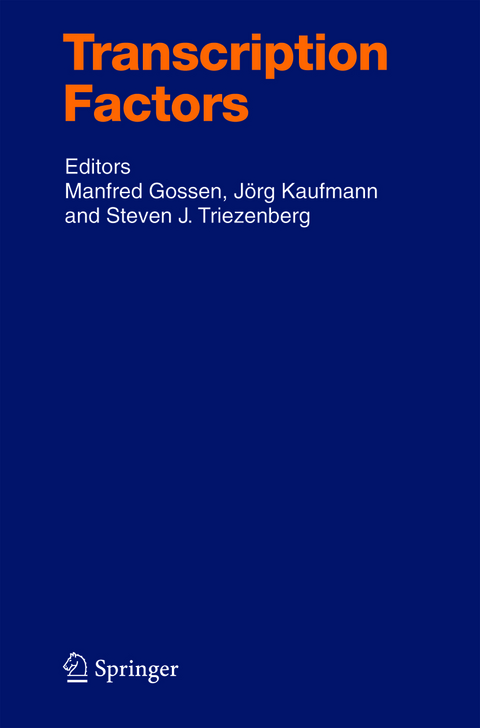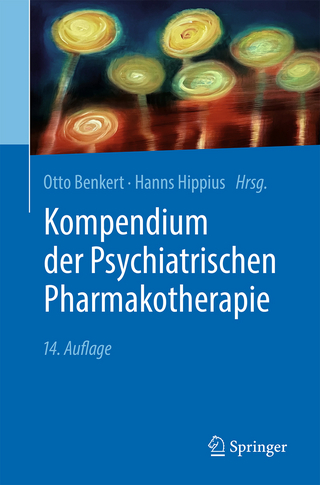
Transcription Factors
Springer Berlin (Verlag)
978-3-642-62361-5 (ISBN)
Transcription factors are key players in the execution of the genomic program of any given cell. Their control over complex patterns of gene expression governs essentially every step in the development, growth and differentiation of an organ ism as well as its physiological responses to external stimuli. An Introduction to Transcription Factors, the first part of this volume, de scribes the varied and combinatorial mechanisms involved in the two basic modes of transcriptional control, activation (the chapter by Herrera et al.) and repression (the chapter by Arnosti). Overlaying both modes is an emerging emphasis on epigenetic regulation that uses intricate patterns of chromatin modi fication. Although many of these mechanisms have been elucidated by studying prototypical genes or transcription factors, the recently developed tools of ge nomic biology allow us to unravel the complexity of global transcriptional pro grams with an ever-increasing speed and accuracy (the chapter by Zacharewski and La Pres). Given the central role that transcription factors playas relays positioned be tween the genome and the intracellular and extracellular signals to which cells must respond, it is not surprising that these regulatory proteins playa major role in pathological processes. Part 2 of this volume, Transcription Factors in Patho physiology, introduces a selection of specific transcription factors and their families. Each of these factors has a well-established function in basic cellular mechanisms that, upon dysregulation, can cause or contribute to human disease.
1. An Introduction to Transcription Factors.- Mechanisms of Transcriptional Activation in Eukaryotes.- Multiple Mechanisms of Transcriptional Repression in Eukaryotes.- Genomic Approaches to the Study of Transcription Factors.- 2. Transcription Factors in Pathophysiology.- Biological Roles of the STAT Family in Cytokine Signaling.- Members of the T-Cell Factor Family of DNA-Binding Proteins and Their Roles in Tumorigenesis.- Transcription Factors in the Control of Tumor Development and Progression by TGF-? Signaling.- The p53 Transcription Factor as Ther apeutic Target in Cancer.- The Role of Ets Transcription Factors in Mediating Cellular Transformation.- Function of the E2F Transcription Factor Family During Normal and Pathological Growth.- c-Myc in Cellular Transformation and Cancer.- NF-?B: Critical Regulator of Inflammation and the Immune Response.- Hepatitis BVirus X Protein: Structure-Function Relationships and Role in Viral Pathogenesis.- Regulation of Xenobiot ic Detoxification by PXR, CAR, GR, VDR and SHP Receptors: Consequences in Physiology.- 3. Exogenous Control of Transcription Factor Activity.- Potential of Transcription Factor Decoy Oligonucleotides as Therapeutic Approach.- Selective Estrogen Receptor Modulators as Therapeutic Agents in Breast Cancer Treatment.- Artificial Zinc Finger Peptides: A Promising Tool in Biotechnology and Medicine.- Tetracycline-Controlled Transactivators and Their Potential Use in Gene Therapy Applications.- Modulating Transcript ion with Artificial Regulators.
| Erscheint lt. Verlag | 17.8.2012 |
|---|---|
| Reihe/Serie | Handbook of Experimental Pharmacology |
| Zusatzinfo | X, 581 p. |
| Verlagsort | Berlin |
| Sprache | englisch |
| Maße | 155 x 235 mm |
| Gewicht | 889 g |
| Themenwelt | Medizin / Pharmazie ► Medizinische Fachgebiete ► Pharmakologie / Pharmakotherapie |
| Medizin / Pharmazie ► Pharmazie | |
| Naturwissenschaften ► Biologie ► Biochemie | |
| Technik ► Umwelttechnik / Biotechnologie | |
| Schlagworte | Biotechnology • cellular transformation • DNA • eukaryote • genes • gene therapy • genomic biology • pathophysiology • Physiology • transciption factor biology • transcription • transcription factors • zinc |
| ISBN-10 | 3-642-62361-1 / 3642623611 |
| ISBN-13 | 978-3-642-62361-5 / 9783642623615 |
| Zustand | Neuware |
| Informationen gemäß Produktsicherheitsverordnung (GPSR) | |
| Haben Sie eine Frage zum Produkt? |
aus dem Bereich


